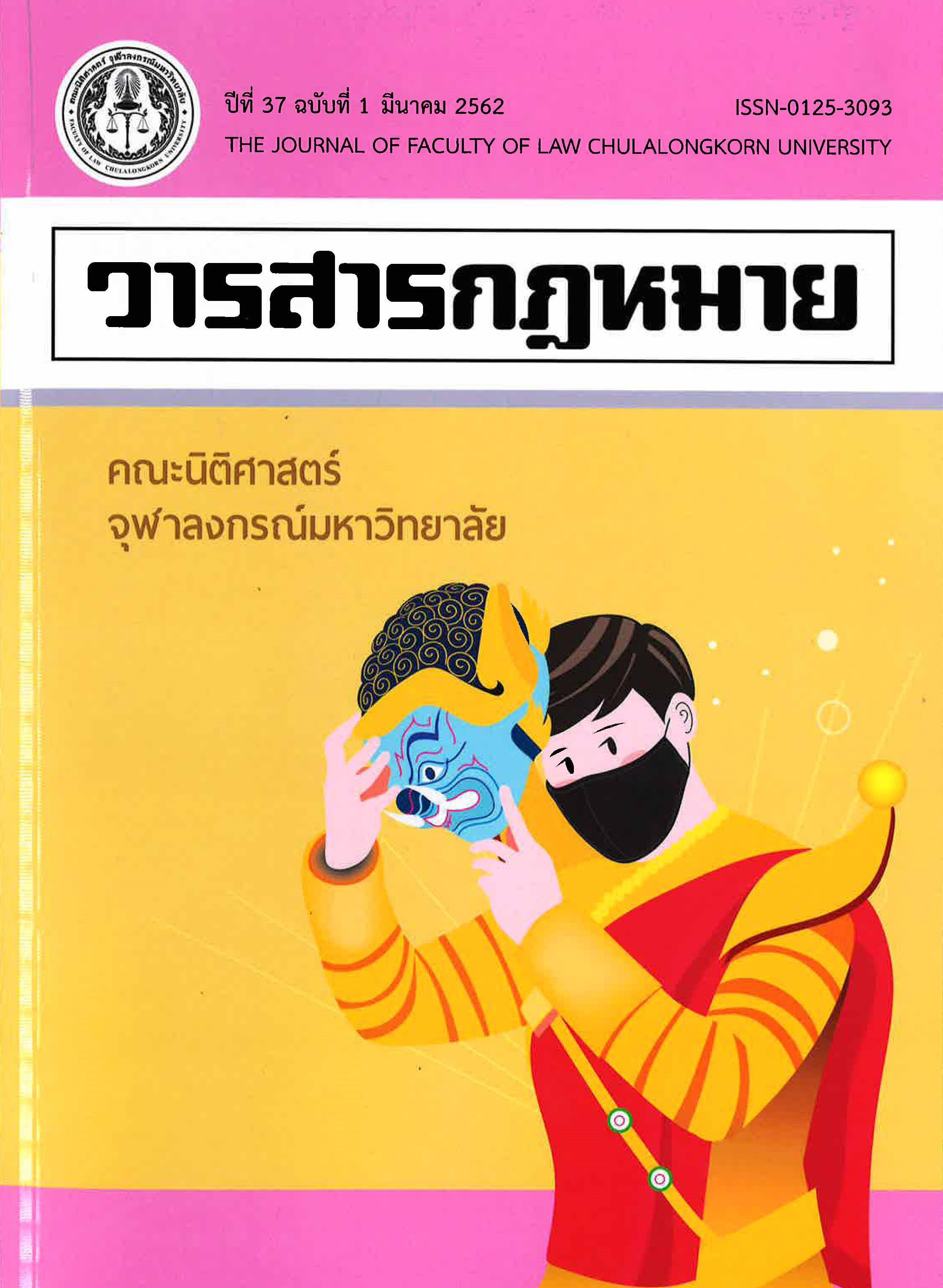ศึกษาเปรียบเทียบมาตรฐานของความประมาทเลินเล่อในคดีทุรเวชปฏิบัติทางแพ่งในประเทศไทยและสหรัฐอเมริกา
Main Article Content
บทคัดย่อ
ปัญหาการฟ้องร้องทางการแพทย์เป็นปัญหาที่มีความสำคัญมากขึ้นในประเทศไทยในปัจจุบัน โดยมีการฟ้องร้องทั้งทางแพ่งและอาญา และมีการเรียกค่าเสียหายเป็นวงเงินที่สูง ซึ่งในการฟ้องร้องคดีทางแพ่งนั้น ผู้ป่วยมักฟ้องร้องเรียกค่าสินไหมทดแทนความเสียหายจากการกระทำโดยประมาทเลินเล่อของแพทย์ อันก่อให้เกิดความรับผิดฐานละเมิดตามมาตรา 420 แห่งประมวลกฎหมายแพ่งและพาณิชย์ งานวิจัยเรื่องนี้ ศึกษาเปรียบเทียบหลักกฎหมายของประเทศไทย เรื่องความรับผิดที่เกิดจากละเมิดตามมาตรา 420 แห่งประมวลกฎหมายแพ่งและพาณิชย์ ในบริบทของการทำการรักษาของแพทย์ เปรียบเทียบกับหลักกฎหมายที่เกี่ยวกับมาตรฐานความระมัดระวัง (standard of care) ในฐานละเมิด ในบริบทเดียวกันใน 50 มลรัฐของสหรัฐอเมริกา
เมื่อเปรียบเทียบระหว่างประเทศไทยและสหรัฐอเมริกาแล้วพบว่ามีความแตกต่างกันทั้งในด้านองค์ประกอบของความรับผิด หลักเกณฑ์ในการพิจารณาเรื่องความรับผิด และมาตรฐานของการกระทำอันถือได้ว่าเป็นการกระทำโดยประมาทเลินเล่อ ในบริบทของการให้การรักษาของแพทย์ และเมื่อวิเคราะห์แล้วพบว่าหากประเทศไทยจะปรับปรุงกฎหมายในเรื่องนี้ อาจทำได้โดยการปรับใช้แนวทางของมลรัฐส่วนใหญ่ของประเทศสหรัฐอเมริกาที่มีการแบ่งแยกระหว่างแพทย์ทั่วไปกับแพทย์เฉพาะทาง โดยถือว่าแพทย์เฉพาะทางนั้นต้องใช้ความระมัดระวังในมาตรฐานที่สูงกว่าแพทย์ทั่วไป แต่ในทางกลับกัน แพทย์ทั่วไปก็ไม่ควรจะถูกวัดด้วยมาตรฐานของแพทย์เฉพาะทาง ยกเว้นในกรณีที่ได้สมัครใจเข้าทำการรักษาแบบเฉพาะทาง นอกจากนี้ ในการพิจารณาว่าการกระทำใดของแพทย์เป็นการกระทำโดยประมาทเลินเล่อซึ่งก่อให้เกิดความเสียหายแก่ผู้ป่วย ประเทศไทยควรพิจารณาแนวทางของประเทศสหรัฐอเมริการในเรื่องการให้ความสำคัญต่อพฤติการณ์ที่เกี่ยวข้อง และในเรื่องการรับฟังพยานหลักฐานจากผู้ทรงคุณวุฒิ ซึ่งมีจุดเด่นที่สำคัญคือมีการคัดกรองคุณสมบัติของพยานผู้ทรงคุณวุฒิ เพื่อให้มีความเป็นกลางและเชื่อถือได้ เพื่อให้เป็นมาตรฐานในการพิจารณาความรับผิดของแพทย์
Article Details
ลิขสิทธิ์และเนื้อหาในเว็บไซต์ของวารสารกฎหมาย (รวมถึง โดยไม่จำกัดเฉพาะ เนื้อหา รหัสคอมพิวเตอร์ งานศิลป์ ภาพถ่าย รูปภาพ ดนตรีกรรม โสตทัศนวัสดุ) เป็นกรรมสิทธิ์ของวารสารกฎหมาย และผู้ได้รับการโอนสิทธิทุกราย
1. วารสารกฎหมาย ให้อนุญาตให้คุณใช้สิทธิอันไม่เฉพาะเจาะจงที่สามารถถูกถอนเมื่อใดก็ได้ โดยไม่มีค่าใช้จ่าย ในการ
- เยี่ยมชมเว็บไซต์และเอกสารในเว็บไซต์นี้ จากคอมพิวเตอร์หรือเครื่องมือสื่อสารผ่านเว็บบราวเซอร์
- คัดลอกและจัดเก็บเว็บไซต์และเอกสารในเว็บไซต์นี้บนลงคอมพิวเตอร์ของคุณผ่านระบบความจำ cache
- สั่งพิมพ์เอกสารจากเว็บไซต์นี้สำหรับการใช้ส่วนตัวของคุณ
- ผลงานที่ได้รับการตีพิมพ์โดยวารสารกฎหมาย จุฬาลงกรณ์มหาวิทยาลัย ถูกคุ้มครองภายใต้ Creative Commons Attribution 4.0 International License ซึ่งอนุญาตให้ทุกคนสามารถคัดลอก แจกจ่าย ดัดแปลง ส่งต่อ ผลงานได้ ก็ต่อเมื่อผลงานและแหล่งข้อมูลได้รับการอ้างอิงอย่างเหมาะสม
2. วารสารกฎหมาย จุฬาลงกรณ์มหาวิทยาลัย สงวนสิทธิ์ไม่อนุญาตให้คุณใช้สิทธิอื่นใดที่เกี่ยวข้องกับเว็บไซต์และเอกสารบนเว็บไซต์นี้ เช่น การคัดลอก ดัดแปลง เปลี่ยนแปลง ส่งต่อ ตีพิมพ์ แจกจ่าย เผยแพร่ จัดแสดงในที่สาธารณะ ไม่ว่าจะในรูปแบบใดก็ตาม ซึ่งเว็บไซต์หรือเอกสารบนเว็บไซต์ โดยไม่อ้างอิงถึงแหล่งข้อมูลหรือโดยไม่ได้รับอนุญาตเป็นลายลักษณ์อักษรจากวารสารกฎหมาย จุฬาลงกรณ์มหาวิทยาลัย
3. คุณอาจขออนุญาตที่จะใช้เอกสารอันมีลิขสิทธิ์บนเว็บไซต์นี้โดยการเขียนอีเมลล์มายัง journal@law.chula.ac.th
4. วารสารกฎหมาย จุฬาลงกรณ์มหาวิทยาลัย เข้มงวดกับการคุ้มครองลิขสิทธิ์อย่างมาก หากวารสารกฎหมาย จุฬาลงกรณ์มหาวิทยาลัยพบว่าคุณได้ใช้เอกสารอันมีลิขสิทธิ์บนเว็บไซต์นี้โดยไม่ถูกต้องตามการอนุญาตให้ใช้สิทธิ ดังที่กล่าวไปข้างต้น วารสารกฎหมาย จุฬาลงกรณ์มหาวิทยาลัยอาจดำเนินคดีตามกฎหมายต่อคุณได้ เพื่อเรียกร้องค่าเสียหายที่เป็นตัวเงินและคำขอชั่วคราวให้คุณหยุดการใช้เอกสารดังกล่าว ทั้งนี้ คุณอาจถูกสั่งให้ชดใช้ค่าใช้จ่ายใดๆ ที่เกี่ยวข้องกับการดำเนินการตามกฎหมายนี้
หากคุณพบเห็นการใช้เอกสารอันมีลิขสิทธิ์ของวารสารกฎหมาย จุฬาลงกรณ์มหาวิทยาลัย ที่ขัดหรืออาจขัดต่อการอนุญาตให้ใช้สิทธิดังที่ได้กล่าวไปข้างต้น โดยเชื่อว่าได้ละเมิดลิขสิทธิ์ของคุณหรือของผู้อื่น สามารถร้องเรียนมาได้ที่ journal@law.chula.ac.th


